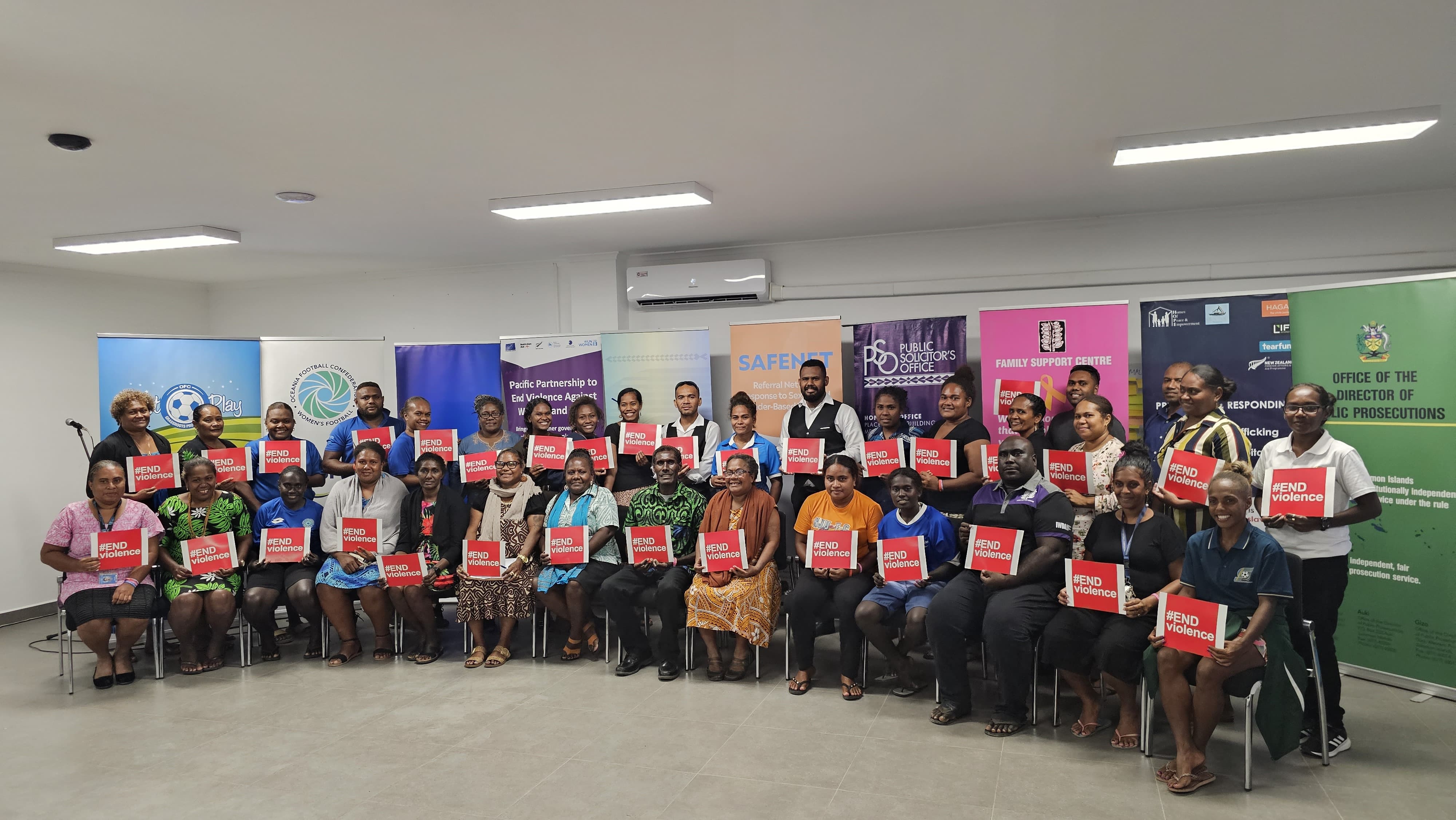Solomon Islands: 21 March 2024 – The Solomon Islands Football Federation (SIFF) in partnership with UN Women with support from the Australian Government through Team Up and the Pacific Partnership to End Violence Against Women and Girls (Pacific Partnership) programme, kicked off on Tuesday 19th March and ended successfully on Wednesday 20th – the country’s first-ever Women’s Football Symposium attended by more than 60 participants at the SIFF Academy.
The two-day Symposium brings together football organisations from the executive level to administrators, coaches, trainers, and the players of clubs and national teams to collaborate on the Theme: Promoting Gender Equality, Preventing Violence Against Women and Girls, and Increasing knowledge on access to quality response services for survivors.
The Symposium is funded by the Government of Australia through Team Up, as well as co-funded with the European Union and UN Women through the Pacific Partnership. The Union of European Football Association (UEFA) is also a co-founder.
The Government through its Ministry of Women, Youth, and Children Affairs (MWYCA) recognised the significance of the Symposium
MWYCFA Deputy Secretary, Aaron Pitaqae, in giving his keynote address, highlighted the event’s objectives to address the critical issue of gender-based violence through the power of sports, specifically women’s football.
In this opening address, SIFF President Donald Marahare emphasised the significance of the historical event, highlighting football’s ability to bring about positive change and create a safe and inclusive environment for all members of the football community, especially women and girls.

“The Symposium aims and objectives are fitting – to discuss, highlight, and seek to address through the medium of football, a critical issue affecting our society, which is ending violence against women and girls.
“Just like all other sectors in the community, the football community cannot turn a blind eye to the instances of abuse, harassment, and discrimination that occur all too often in our communities. It is time for us to take a bold stand and say ‘enough is enough’.

SIFF is committed and continues to work towards creating a culture of zero tolerance for all forms of violence through its Safeguarding Policy for Children and Adult Safeguarding under SIFF’s Social Responsibility program.
“These policies aim towards creating a safe and supportive environment where individuals can participate in football free from harm and violence,” MWYCFA Deputy Secretary Pitaqae remarked.
“We have a problem of violence against women and girls in our country, and we must address it. The Government through the Ministry has flagship policies that not only advocate for recognising the work of women and girls in all spheres of influence but also in endeavors to empower them to be active participants in society.”
He added that the Ministry has developed policies that recognise the important roles of women, and that women are key partners in all decision-making in the community.
The Australian High Commission in Solomon Islands Senior Gender Advisor, Joanne Zoleveke, reemphasized Australia’s commitment to gender equality and ending violence against women and girls in sports.

“Australia is pleased to support this through our Team Up programme and our Pacific Partnership programme with the European Union and UN Women. I commend SIFF for its leadership in bringing these together – through the power of sport, and specifically women’s football to focus on the critical issue of gender-based violence.”
“It is vital that football is safe and accessible for all players, officials, and administrators. Football through its global profile and enormous popularity is a powerful tool that can be used to advance social change and to empower women and girls.
EU’s representative, Mr Pedro Velazquez said, “when it comes to violence against women and girls, positive changes are possible through football and within football. This Women’s Football Symposium is showing the power and the need for a sound long-lasting partnership of football governing bodies, government and international partners for the benefit of women and girls in the Solomon Islands”.
In her remarks, UN Women’s Solomon Islands Country Programme Coordinator, Alvina Erekali, said “Solomon Islands has one of the highest rates of gender-based violence in the world, with 64 percent of women between the ages of 15 to 49 years experiencing intimate partner violence. At UN Women, we are committed to working with partners such as the Government of Solomon Islands, SIFF, our Pacific
Partnership donors, and many others, to use sports as strong and powerful platform to advocate for change in the sport itself so it’s safer for women and girls, and beyond in our communities. Women and girls are often just viewed as spectators, but this no longer true for Solomon Islands. Evidence is showing that that participation in sports can help break-down gender stereotypes, improve girls’ and women’s self-esteem and self-confidence, and contribute to the development of leadership skills. We are supporting women and girls to be empowered and safe both on and off the field and at all levels of sports administration.
The Symposium gathered stakeholders with a mutual advocacy approach.
-SIFF Media/UN Women/EU
///End///




